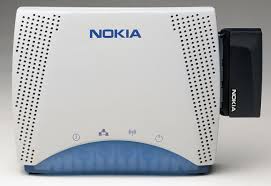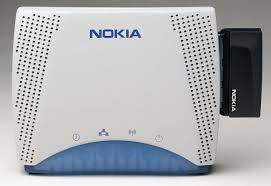
Breaking into the Juniper and Cisco dominated core router market and giving its existing network business a boost, Nokia launched the world's fastest network chips.
The Finnish company said that greater demands of next-generation mobile communications, cloud-based internet services and virtual reality programming can be handled by the new traffic routers.
Nokia can be helped to win business from companies such as Facebook, Google, Apple and Amazon by its new products, which grew out of its 15.6 billion-euro ($17.5 billion) 2016 acquisition of Alcatel and its IP network gear business.
Unlike Nokia's traditional telecoms customers they are still increasing spending on network gear because for these "web-scale" customers speed is everything.
There are existing customers of Nokia who are still contend with legacy gear needed to run existing services but they still want speed and the routers will help such customers and are compatible with older products.
"Nokia will have the highest-performance system capacity in the market, and a lot of those web-scalers, they just want speed," Ray Mota, principal analyst at ACG Research, told Reuters.
Having displaced Juniper Networks, which is now No. 3. and just behind Cisco is the former Alcatel IP networks business which is already the world's No. 2 player in edge routers.
In router markets outside the United States, where the privately-held Chinese firm is barred for national security reasons, the Nokia business also competes with Huawei.
Including competitors like Cisco and Juniper as well as Huawei, Nokia executives expect to take market share from all the big competitors.
"Whether its web-scale or vertical markets (such as banks, transportation, energy and public sector), where we have been less exposed in routers, clearly we will gain share," Nokia Chief Executive Rajeev Suri told Reuters in an interview.
"This gives us momentum in core routing."
Companies that can be the hardest hit are ones like Juniper, which depends for around a quarter of sales from web-scale customers such as Facebook, said Simon Leopold, a financial analyst with Raymond James "There is at least headline risk to Juniper, once Nokia ships," he said.
While Cisco fell 1 percent to $31.38, shares of Juniper Networks fell 2.4 percent to $28.60. there was a dip of a little under 1 percent in Nokia's U.S.-listed shares.
Capable of processing data at 2.4 terabits per second, it is introducing its latest FP4 silicon chipset, Nokia said. With routers running FP4 chips ready in the first quarter of next year, the new chipsets are set to ship in the fourth quarter.
"Edge" networks that link datacentres to front-line customer services on mobile or fixed-line networks and ultra high-speed "core" networks at the heart of the biggest internet services would both can be operated by routers into which they will be built.
Nokia is turning to web-scale players whose spending on new network gear is growing by double-digits since telecom operators' capital spending is rising by just 2-3 percent a year.
To help it win business from customers such as Apple and Facebook, Nokia is introducing the 7950 petabit-class router aimed at the core routing market. 5,000 two-hour-long high-definition videos every second can be transit by a petabit. Offering the highest traffic capacity on the market, Nokia is introducing its 7750 router, for edge network customers.
(Source:www.reuters.com)
The Finnish company said that greater demands of next-generation mobile communications, cloud-based internet services and virtual reality programming can be handled by the new traffic routers.
Nokia can be helped to win business from companies such as Facebook, Google, Apple and Amazon by its new products, which grew out of its 15.6 billion-euro ($17.5 billion) 2016 acquisition of Alcatel and its IP network gear business.
Unlike Nokia's traditional telecoms customers they are still increasing spending on network gear because for these "web-scale" customers speed is everything.
There are existing customers of Nokia who are still contend with legacy gear needed to run existing services but they still want speed and the routers will help such customers and are compatible with older products.
"Nokia will have the highest-performance system capacity in the market, and a lot of those web-scalers, they just want speed," Ray Mota, principal analyst at ACG Research, told Reuters.
Having displaced Juniper Networks, which is now No. 3. and just behind Cisco is the former Alcatel IP networks business which is already the world's No. 2 player in edge routers.
In router markets outside the United States, where the privately-held Chinese firm is barred for national security reasons, the Nokia business also competes with Huawei.
Including competitors like Cisco and Juniper as well as Huawei, Nokia executives expect to take market share from all the big competitors.
"Whether its web-scale or vertical markets (such as banks, transportation, energy and public sector), where we have been less exposed in routers, clearly we will gain share," Nokia Chief Executive Rajeev Suri told Reuters in an interview.
"This gives us momentum in core routing."
Companies that can be the hardest hit are ones like Juniper, which depends for around a quarter of sales from web-scale customers such as Facebook, said Simon Leopold, a financial analyst with Raymond James "There is at least headline risk to Juniper, once Nokia ships," he said.
While Cisco fell 1 percent to $31.38, shares of Juniper Networks fell 2.4 percent to $28.60. there was a dip of a little under 1 percent in Nokia's U.S.-listed shares.
Capable of processing data at 2.4 terabits per second, it is introducing its latest FP4 silicon chipset, Nokia said. With routers running FP4 chips ready in the first quarter of next year, the new chipsets are set to ship in the fourth quarter.
"Edge" networks that link datacentres to front-line customer services on mobile or fixed-line networks and ultra high-speed "core" networks at the heart of the biggest internet services would both can be operated by routers into which they will be built.
Nokia is turning to web-scale players whose spending on new network gear is growing by double-digits since telecom operators' capital spending is rising by just 2-3 percent a year.
To help it win business from customers such as Apple and Facebook, Nokia is introducing the 7950 petabit-class router aimed at the core routing market. 5,000 two-hour-long high-definition videos every second can be transit by a petabit. Offering the highest traffic capacity on the market, Nokia is introducing its 7750 router, for edge network customers.
(Source:www.reuters.com)














